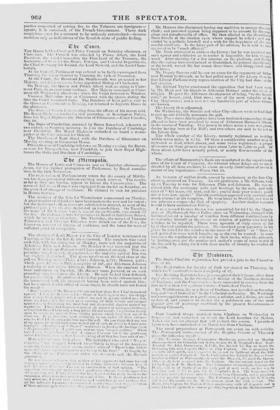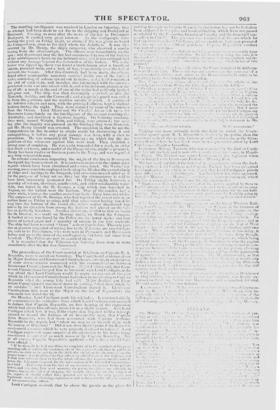Four hundred trimly.; marched from Chatham on IVethiesday to Gra...vs.:ell,
and embarked on board the 1,erd Lowther t'or Madras. 'rids is the last (If:tech:nem that N, ill embark this season. Upwards of 7,00u men have embarked sieee March last front C'hatliam.
Thc naval preparations at Portsmouth sate going on evith activity. The Portsmouth corres; oteleat of the III iyIthm(;trite of Thursday give; the following re;mrt steamer, Comm:older proceeded nu Afoialay
afternoon divert for (;ihraltar and .11..lta, I', join Sir It. StapIin-d'.s Elect. Ilvar. Admiral Sir John Ointnamicy, 4i:a his flag 011 1111111'11 111C
B1111.1111111, 120, 1V1111 C111113111 Drat,, us Flag I.:Nil:till. ::be- is preporieg for h.:, with all d.--patch, ;mil is exano, to out to Spitlwatl :Llama .the 211th im..tant, 0r sAHlcs if requii.A. Sir hoisted hi, a. Coln- yriaOt.r-iii. Chief
it l'orttisioatli, its aieiti! the Iliett!;tI, until the Queen,
II), ; to IA: ri-oloveil into II, 11011,011r. :till(' Was (.111111111,'.10001 011 1110 1•1 1.y CW01,111 .1. NV. Alaii1i,i/.11, The S darn:In:ler 0.eani-frigate, Commander 11 he 11.1., r.uIs part of /Wit 011 111.1. it ay to ;1!“1 `• to jolt! ),tripforir...1 it,.t. tithe viligeaucc, Kt, uud, T •, it)', `.foul Plymouth, and i. priTarint; i 1,o—inn, for comini lulu. Tts- (*angina, 1,1, (..tiahin Sir S. Il.,la•rtg,
mouth ram-an about the The I 1..tiplain Sir \Vat;..in progreiimilig With all ilvairitch, and 01 tu he at. I'pilletad. ',sou a. p. - Is proceed to the Aleiliterritiieuni"
The startling intelligence was received in London on Saturday, flint an attempt had been made to set fire to the shipping and Dockyard at Sheerness. Coming so soon after the news of the fire in Devonport Dockyard, it excited very great interest. As the wurkpeoplc were leaving the yard on Friday night, an alarm of fire was given on board the Camperdown, close to the shed where the Achille is. It was dis- covered by Mr. Ilenty, the ship's carpenter, who observed a smoke issuing from the after-cockpit. The officers were immediately on the spot ; and discovered that the fire had commenced in one of the Inc!-:. of the midshipmen's berth on the larboard side ; and it was extingui.lesi without any damage beyond the destruction of the locker, Wile.. lb:, locker was ripped up, there was found a hirchsbroom over a bundle cot oakum, pounded resin, and a lock of hay, immediately over the bed ,r between the beams. After this discovery had heen made, the ollieere found other combustible materials secrete I inside one of the lattIeed racks, consisting of oakum spread out in trains, and a lceiftr-match t.t the end of each train, and matches also intermixed with the oakum : powdered resin was also mixed with it, and a birch-broom placed on the top of all; a match at the end of one of the trains had evidently ignited and gone out. The ship was then thoroughly searched, is also the Monarch, A clinic, and the Cornwall; and a captain's guard was called in from the garrison, and the sentries outside doubled. A porli0:1 of the inferior ollieers and men, with the principal officers, kept a vigilant lookout during the night. They were assisted by some of the marines from the Ocean. Lord Minto and Sir Charles Adem left town fer Sheerness immediately on the intelligence of the attempt reaching th.; Admiralty, and instituted a rigorous inquiry. On Saturday morning. three men, named Wright, Britt, and Grigg, were arrested; but next day (for the inquiry was pursued on the Sunday) they were lil crated, and Mr. Relay himself was arrested. The suspicion is, that he set the Camperdown on fire in order to obtain credit for discovering it and extinguishing it befbre any great damage was done, with a 'View to promotion. Ile was remanded till Thursday ; on which day the de- positions of the witnesses against him were read. They establish a strong ease of suspicion. He was again remanded for a week, in crier that fresh evidence, anda model of the Camperdown, might be procured. linty has been twelve or fourteen years in the Navy, and was regarthd as a very respectable man.
No certain conclusion respecting the origin of the fire in D:voaport Dockyard has been arrived at. It is useless to enumerate the e xtravagaet reports which have been circulated and cantradieted. On Wednes Lty evening, some convicts employed in clearing the Minden discos ered a Lea p of chips and :,liavings in the forepeak, laid crosses isc on each other as it for the purpose of being set on fire; but the circumstance is said to have been innocently accounted for. Oa Friday night, however, a quantity of oakum, shavings, eandle-ends, and other combustible mate- rials, was found its the St. George, a ship which was launched in August, on the ballast near the keelson. 0:le of the candles had. a white wick, whereas the candles served out in tic,: Navy- have red The carpenter of the St. George, who had reported the.vessel one at ms earlier hour on Friday evening, said that son: water having usual its way into the bottom of the vessel, the matter discovered was taken by his direction front among the and placed on the bal-
last as perfectly harmless. Another discovery, similar to that no hoard
the St. Georece. wes made on Monday on Board the Canopus. A bucket of tar was found by the Police on the lower deck; mid binir sheets of tarred paper and a quantity of oakum in the fore cock-pit. The ship had beeu reported " clean " a short time heti-ire. The only par- ties at present suspected of setting fire to the'l'aIavrra, arc two t'oreign- ers, said to he Frenehmen, who were seen in Plymouth and. Devcemert belbre and up to the time of the contleg,ration, but have not since been heard of. The Police are now in search of them.
It is reniarl:ec that fhe Talavera was burning from stem to stern imatediate/g after the fire was discovered.



























 Previous page
Previous page